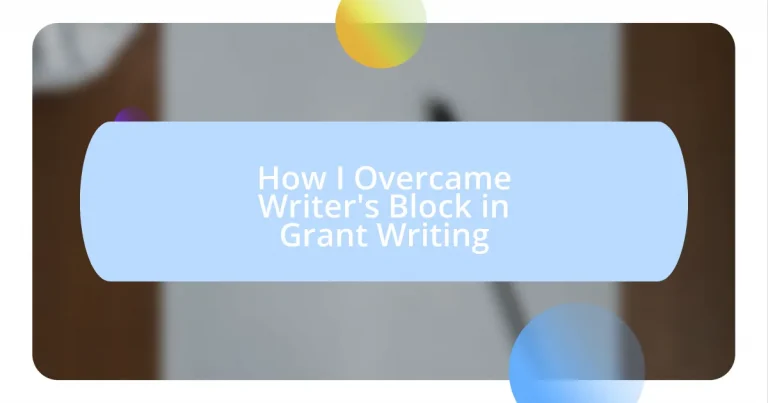Key takeaways:
- Writer’s block often originates from perfectionism, fear of failure, and self-doubt, which hinder creativity and flow.
- Creating a conducive writing environment, including decluttering and incorporating natural elements, can enhance focus and alleviate stress.
- Establishing a regular writing routine and allowing for spontaneity helps stimulate creativity and maintain momentum.
- Seeking feedback and reflecting on progress can provide valuable insights and foster a supportive writing community.
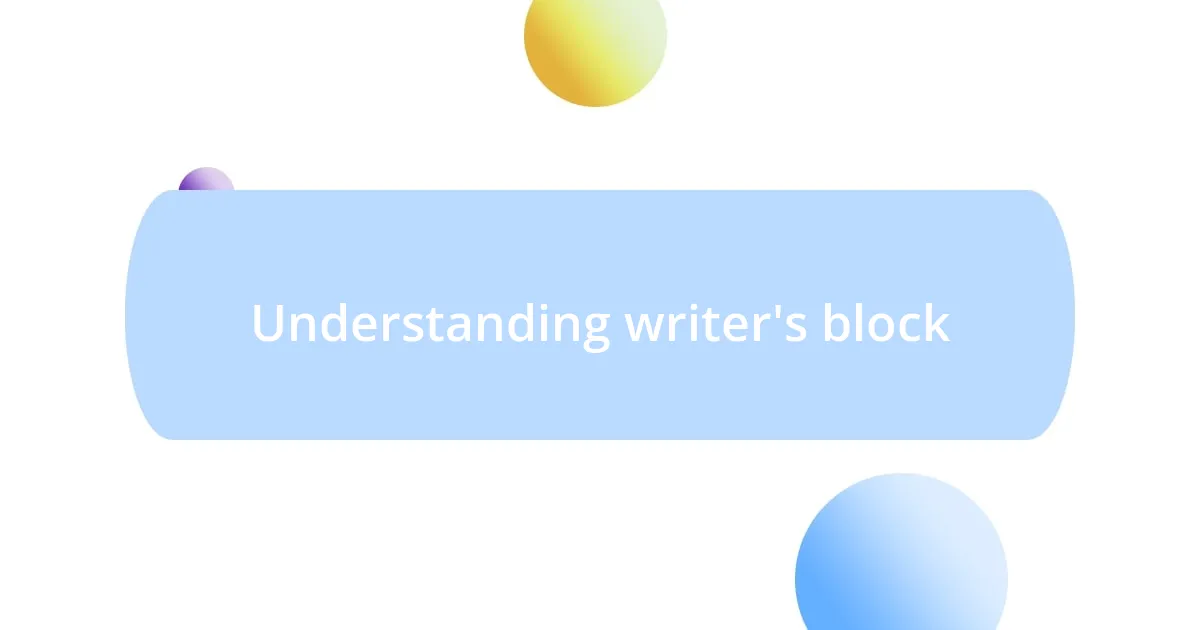
Understanding writer’s block
Writer’s block is a frustrating and often perplexing experience. I remember staring at my screen for hours, feeling that familiar heaviness in my chest, as if my thoughts were trapped beneath a thick layer of fog. Have you ever felt that sinking feeling when you know what you want to say, but the words just won’t come?
At its core, writer’s block can stem from various sources—perfectionism, fear of criticism, or even overwhelming pressure to succeed. I once had a grant application looming over me, and the thought of crafting the perfect narrative felt daunting. It made me question my abilities and the impact of my proposal, leaving me in a cycle of self-doubt. Have you been there too, paralyzed by the need to get everything just right?
Understanding the emotional landscape of writer’s block is crucial. It’s not just a lack of creativity; it’s about our inner thoughts and feelings colliding with the expectations we place on ourselves. I realized that the more I focused on the outcome, the more difficult it became to express what truly mattered in my writing. Doesn’t it often seem like the pressure we put on ourselves only adds to the frustration?
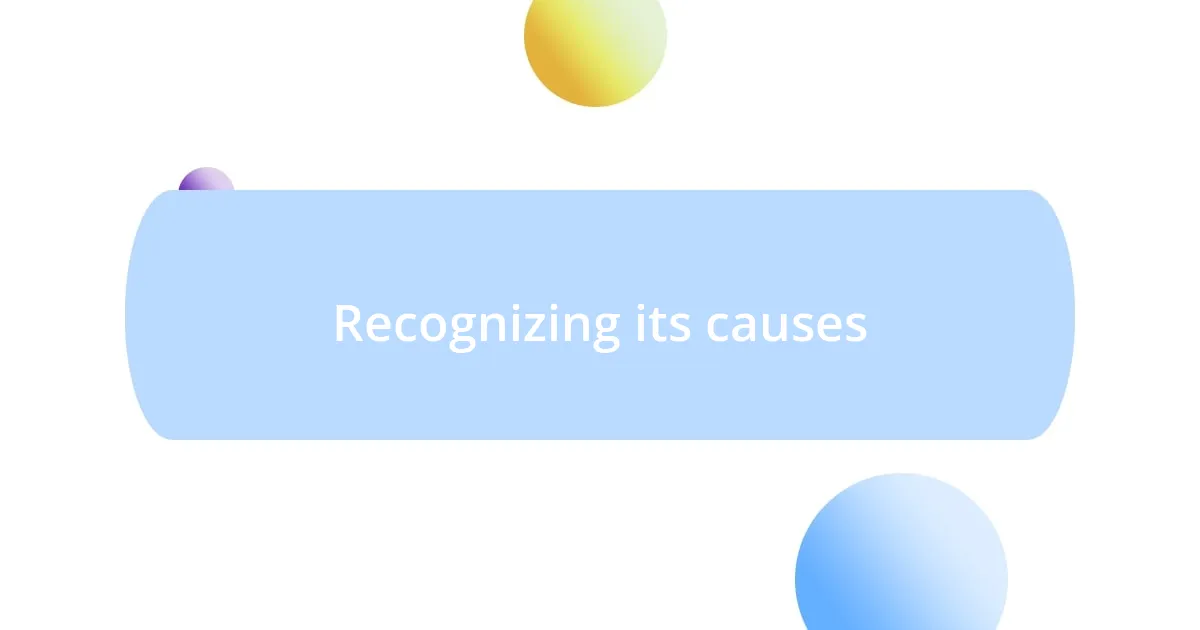
Recognizing its causes
Recognizing the root causes of writer’s block is essential for moving forward. I’ve found that many writers, including myself, struggle with the weight of expectations—both from external sources and our own high standards. It’s as if our minds become a battleground, where creativity cannot thrive amidst self-imposed stress. Have you ever noticed how a nagging deadline seems to amplify your anxiety instead of igniting motivation?
One prominent cause is the fear of failure, a sentiment that often creeps in during grant writing. I vividly recall a time when I hesitated to start drafting a proposal because I feared my ideas wouldn’t resonate with the reviewers. This fear paralyzed my creativity and kept me locked in a cycle of inaction. Fear can be a silent killer of creativity; recognizing this allows us to acknowledge and confront it.
Perfectionism can manifest in various forms, like over-editing at the initial drafting stage. I vividly remember a time when I spent hours polishing a single sentence, utterly missing the big picture of my proposal. It’s vital to step back and see where perfectionism disrupts our flow. By identifying and labeling these inhibiting thoughts, we can begin to navigate through them and free ourselves from the shackles of writer’s block.
| Cause | Description |
|---|---|
| Fear of Failure | Feeling anxious about the quality and reception of one’s work, leading to inaction. |
| Perfectionism | An overwhelming desire to achieve an unattainable standard, stifling creativity and flow. |
| Self-Doubt | A lack of confidence in one’s abilities, creating a mental barrier to writing. |
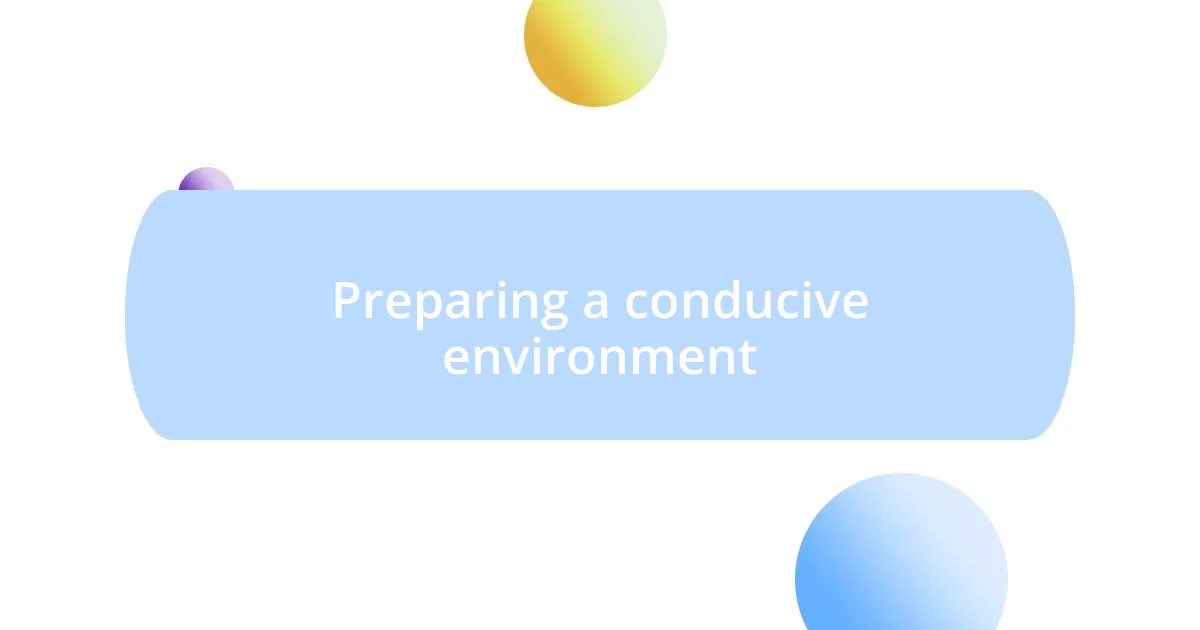
Preparing a conducive environment
Creating a conducive environment is pivotal in overcoming writer’s block, especially in grant writing. I remember setting the scene in my favorite corner of the room, where sunlight poured in through the window. I made simple adjustments, like decluttering my workspace and adding a plant for a touch of life. These small changes significantly lifted my mood and focus, encouraging my thoughts to flow more freely.
Here’s how you can transform your space into a writing haven:
- Change your surroundings: Find a dedicated, quiet space where you can think and write without distractions.
- Incorporate natural elements: Adding plants or natural light can create a calming atmosphere.
- Organize your materials: A tidy space allows you to find your tools quickly, reducing mental clutter.
- Limit distractions: Silence notifications on your devices or use apps designed to help you focus.
- Personal touches: Surround yourself with items that inspire you, whether it’s artwork, quotes, or photos.
These steps, though simple, can create a psychological impact that makes tackling those daunting grant applications feel less like a chore and more like an exciting challenge.
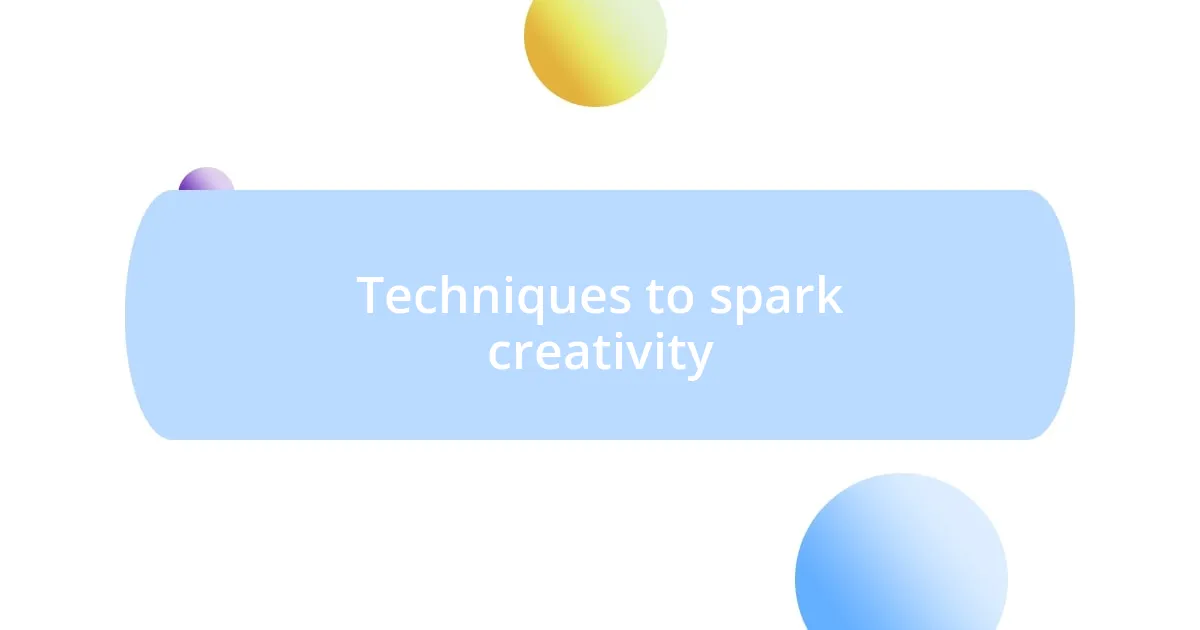
Techniques to spark creativity
Finding that spark of creativity, especially when crafting grant proposals, can often feel like chasing a mirage. One technique that has worked wonders for me is brainstorming freely. I remember a particular afternoon where I dumped my thoughts onto paper—a messy, unfiltered collection of ideas. It wasn’t about quality or structure; it was about letting the ideas flow. Have you ever experienced that rush when the ideas start spilling out, unencumbered by judgment? It’s liberating and, surprisingly, incredibly effective.
Another method I’ve come to cherish is changing my perspective. I often ask myself, “What would I advise a friend to do in this situation?” By stepping outside of my own shoes, I can offer fresh insights that my inner critic would never entertain. I recall a time when I was stuck on how to frame a proposal’s impact section. By thinking of how I would guide a colleague through the same challenge, I not only found clarity but also re-energized my writing. It’s funny how shifting the frame can unlock new pathways to creativity.
Lastly, incorporating playful exercises into my routine has made a noticeable difference. Whether it’s sketching ideas on a whiteboard or even playing with words through poetry, these whimsical activities can evoke that elusive creative energy. There was a day I sat with a musical playlist, allowing sounds to inspire my thoughts while jotting down whatever came to mind. Letting yourself play—have you tried it? It’s like permission to explore, free from the confines of linear thinking. Sometimes, creativity needs that playful nudge to remind us of its boundless potential.
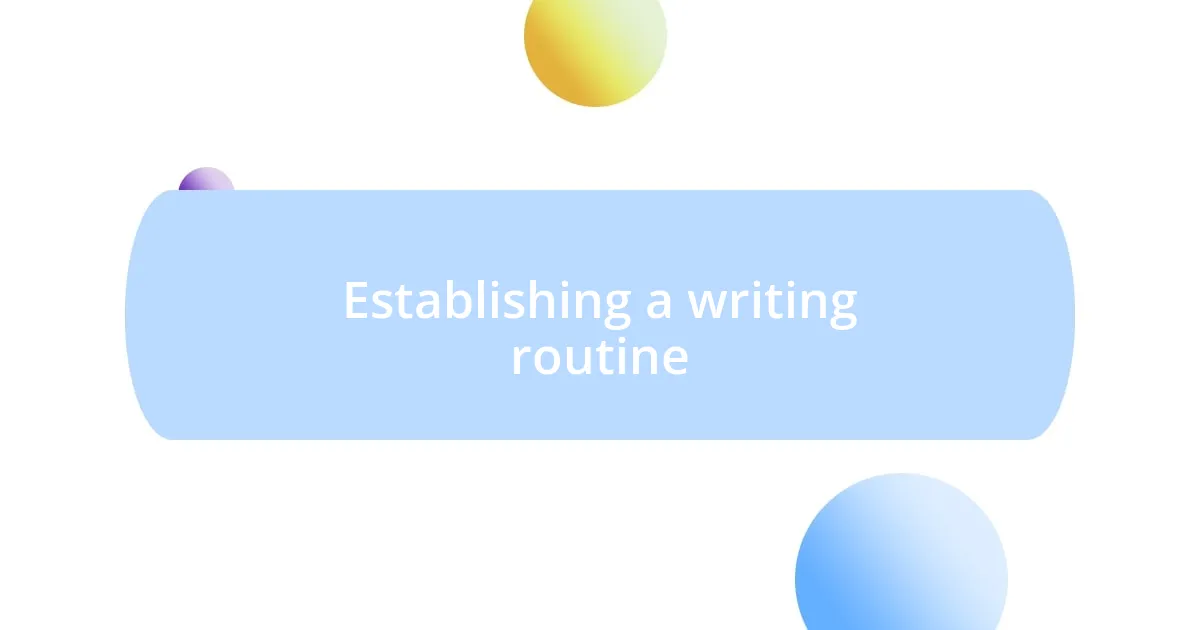
Establishing a writing routine
Establishing a writing routine changed everything for me. I chose a specific time each day to write, treating it like an appointment I couldn’t miss. At first, it felt a bit forced, but the more I committed to it, the more natural it became. Have you ever set aside time for something you initially dreaded? I found that once I got into the groove, those sessions became the highlight of my day.
One afternoon, I decided to blend my routine with a bit of spontaneity. I would allow myself to write for 30 minutes and then take a break to walk outside and gather my thoughts. This simple shift not only revitalized my creativity but also brought me fresh perspectives I wouldn’t have considered if I had remained glued to my desk. Isn’t it interesting how a change of scenery can stimulate new ideas and calm those racing thoughts?
Over time, I also recognized the power of rituals in my routine. For me, it was making a cup of herbal tea right before I sat down to write. As the familiar aroma filled the air, I felt a wave of calm wash over me, signaling that it was time to focus and create. What little habits help you transition into your writing space? It’s those small, deliberate actions that can provide the grounding we often need when facing the blank page.
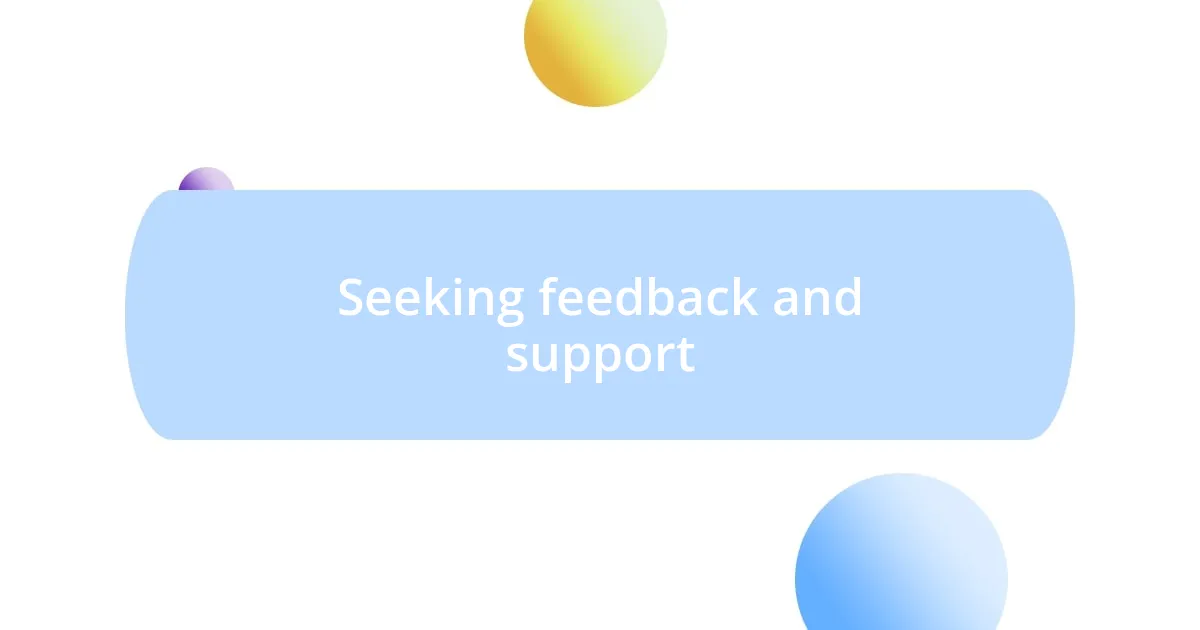
Seeking feedback and support
When I found myself wrestling with writer’s block, seeking feedback was like tossing a lifeline. I vividly remember a time when I hesitated to share my draft with a trusted colleague because I feared harsh criticism. When I finally took the plunge, their constructive insights not only clarified my ideas but also gave me the confidence to refine my approach. Have you ever held back your work for fear of judgment, only to find that an outside perspective sheds light on what you couldn’t see?
Support from others can also create an empowering environment that fosters creativity. I often participate in a local writing group where we share our grant proposals and provide each other with constructive feedback. Just last month, one of my peers offered a suggestion that completely transformed the way I presented my project’s objectives. I felt energized by their enthusiasm; it was a reminder that collaboration can ignite that elusive creative spark. How do you feel when you receive positive feedback? Personally, it fills me with motivation to dive back into my writing with renewed vigor.
Additionally, sharing my struggles openly has made a significant difference in my writing journey. During a tough phase, I reached out to mentors who had faced similar challenges, and their stories resonated with my own experiences. One mentor’s encouragement to embrace vulnerability in our work changed my mindset. It was almost freeing to realize that we all grapple with these blocks and that seeking support is a vital part of the process. Isn’t it comforting to know you’re not alone in this journey?
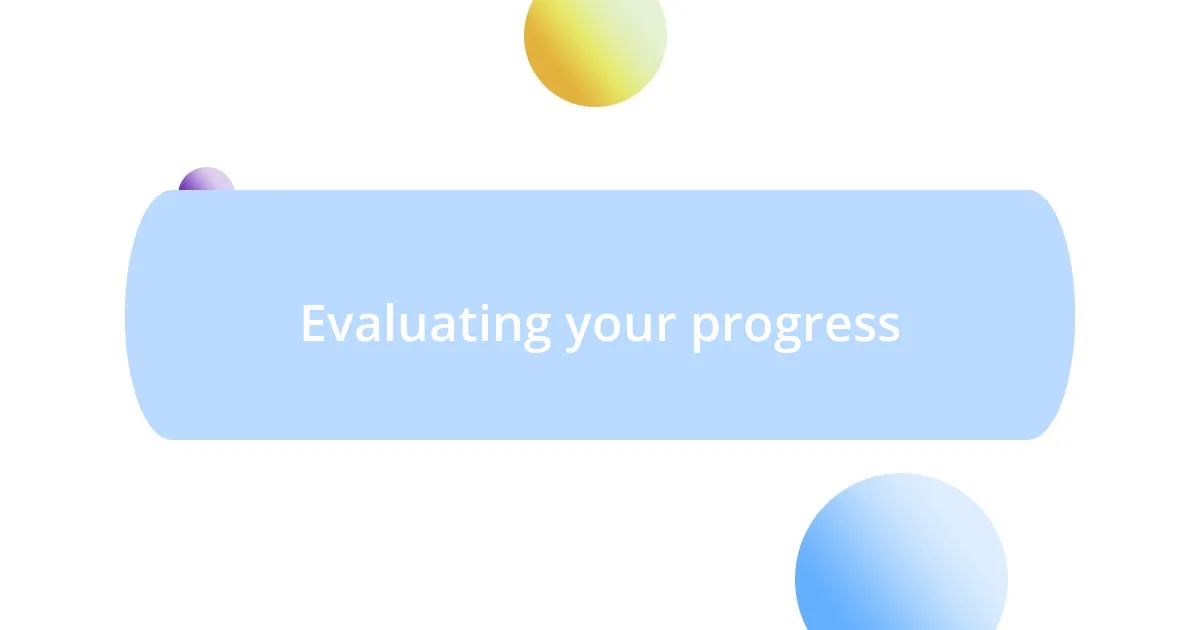
Evaluating your progress
Evaluating your progress is a crucial step in overcoming writer’s block, especially in grant writing. Reflecting on where you started versus where you are now can provide insights that might be otherwise overlooked. I remember the first few drafts I submitted—they were filled with uncertainty and hesitation. Each time I revisited those initial attempts, it became clear how far I’d come, both in clarity and confidence.
One technique I found particularly helpful was maintaining a progress journal. I started jotting down not just word counts, but also my thoughts and feelings about each writing session. This practice allowed me to identify patterns in my writing habits and moods. Have you ever looked back at a past project and realized how much you’ve learned? Those reflections often highlight how our struggles contribute to growth, even when it doesn’t feel that way in the moment.
Additionally, sharing my progress with peers has been revealing. In a recent discussion with fellow grant writers, we compared notes on our revisions. Some of us had made significant strides, while others were still wrestling with initial drafts. The variety of our experiences reaffirmed that progress isn’t always linear. It’s vital to celebrate the small victories, whether finishing a section or finally understanding a complex requirement. How do you track your milestones? I find that recognizing each step, no matter how small, keeps me motivated to push through blocks and remain engaged with my writing.












